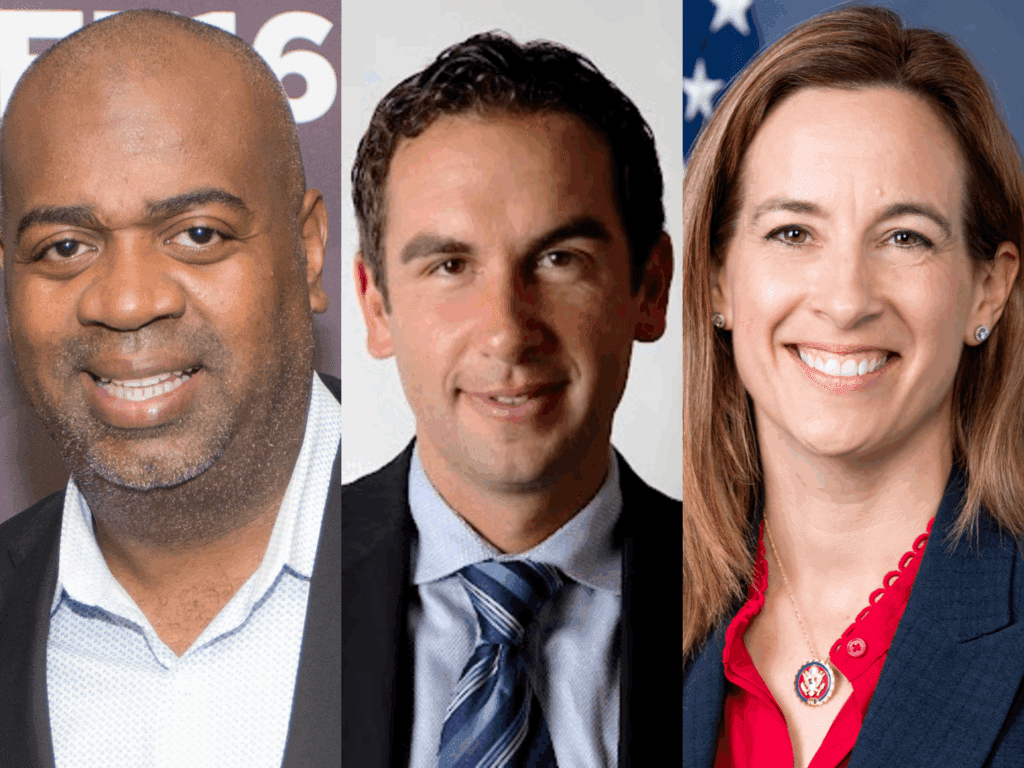There’s only four weeks to go until the NJ Democratic Primary on June 10. On Monday, five Democratic candidates met for the first of two official debates.
Jersey City Mayor Steve Fulop, Newark Mayor Ras Baraka, U.S. Reps. Mikie Sherrill and Josh Gottheimer and former Senate President Steve Sweeney took part in the televised forum hosted by NJ PBS and WNYC. A sixth candidate Sean Spiller, president of the New Jersey Education Association, was absent from the debate, failing to meet the required donation threshold to participate.
The candidates clashed early over recent disruptions at Newark Liberty International Airport, where radar outages and staffing shortages have grounded flights and strained operations. Baraka called for reducing the number of flights for safety, while Gottheimer argued that Newark is a critical economic engine that should not be scaled back.
NJ Transit, Energy and Immigration
Transportation woes extended beyond EWR. All five candidates agreed that the ongoing NJ Transit labor dispute demands direct intervention from Governor Murphy. Fulop and Baraka criticized the state’s $11 billion Turnpike widening plan, arguing the money could be better used to address transit infrastructure. This is a policy point that Fulop specifically has vowed to tackle in his first 100 days if elected.
Energy policy was another dividing line. Sherrill called for increased accountability from PJM, the region’s grid operator, and proposed ramping up solar and nuclear investments. Fulop emphasized the need to phase out fossil fuels and restructure energy rates for large corporations, while Baraka urged continued support for offshore wind and solar development.
On immigration, Fulop vowed to push for passage of the Immigrant Trust Act, a bill that would restrict local cooperation with federal immigration enforcement. Sweeney dismissed the legislation as symbolic, saying it offered “false hope.” Baraka and Sherrill defended protections for immigrants, but Sherill was forced to fend off criticisms by other candidates who claimed she supported Trump’s border wall funding.
Affordability emerged as a dominant theme, with candidates offering plans to reduce property taxes and expand housing access. Sherrill proposed first-time homebuyer incentives and commercial property conversions. Baraka and Fulop noted the state already supports such programs. Gottheimer promoted shared services and tax cuts, likening current municipal procurement to “paying Wawa prices instead of Costco prices.” Sweeney pledged to build 200,000 new housing units in five years using existing state reserves.
Affordability and Housing
Fulop also highlighted the need to build more housing, specifically affordable housing. “Nobody on this stage has build more affordable housing than I have,” said Fulop.
The candidates largely agreed on reforming school funding, consolidating districts, and fully funding public worker pensions. They also committed to supporting the Democratic nominee, regardless of who wins the June 10 primary.
Despite the display of unity, tensions ran high at times. Fulop accused Gov. Phil Murphy of being too soft on former President Donald Trump. Sherrill rejected parental opt-out provisions for LGBTQ education, warning against what she called “a slippery slope.” Gottheimer pointed to the mental health toll of anti-LGBTQ policies, citing high suicide rates among transgender youth.
Mayor Ras Baraka’s Arrest
Baraka’s recent arrest during a protest at a federal detention center added new visibility to his campaign, while Fulop picked up a major endorsement over the weekend from the Philadelphia Inquirer.
The latest Rutgers-Eagleton poll shows Sherrill narrowly ahead, only separated by single digits from the other candidates. Fulop has made gains in each poll released, while Baraka has slightly slipped back. However, no polling has been released since Baraka’s arrest last week, which is assumed to have increased his favorability as a fighter for New Jersey.
Who Won the Debate?
Fulop and Baraka each separated themselves from the rest of the candidates with a policy-driven approach to the debate. If you prefer a housing and transportation-focused policy wonk who will fight for NJ against the establishment, then Fulop is probably your preferred candidate.
Those who prefer a similarly-aligned vocal firebrand might lean toward Baraka, who has established himself as potentially the strongest voice against the Trump Administration and Republicans.
Steve Sweeney and Mikie Sherrill also had strong performances. Sherrill was able to point toward her voting record as a member of the U.S. House of Representatives, but this also came with baggage as other candidates were able to reference that same record by pointing toward times in the past that could be seen as her siding with Trump. This was used to accuse her of voting to fund Trump’s border wall.
Gottheimer’s performance was lackluster. The moderate failed to establish himself as an inspiring candidate, sticking to tax relief as his number one issue. Often circling back to it during unrelated topics. Still, he claims to be the only candidate that has a plan to lower taxes for NJ residents.
Another debate will be hosted by NJ Globe on May 18 at 7 p.m.
The New Jersey Digest is a new jersey magazine that has chronicled daily life in the Garden State for over 10 years.
- Staffhttps://thedigestonline.com/author/thedigeststaff/
- Staffhttps://thedigestonline.com/author/thedigeststaff/
- Staffhttps://thedigestonline.com/author/thedigeststaff/
- Staffhttps://thedigestonline.com/author/thedigeststaff/


